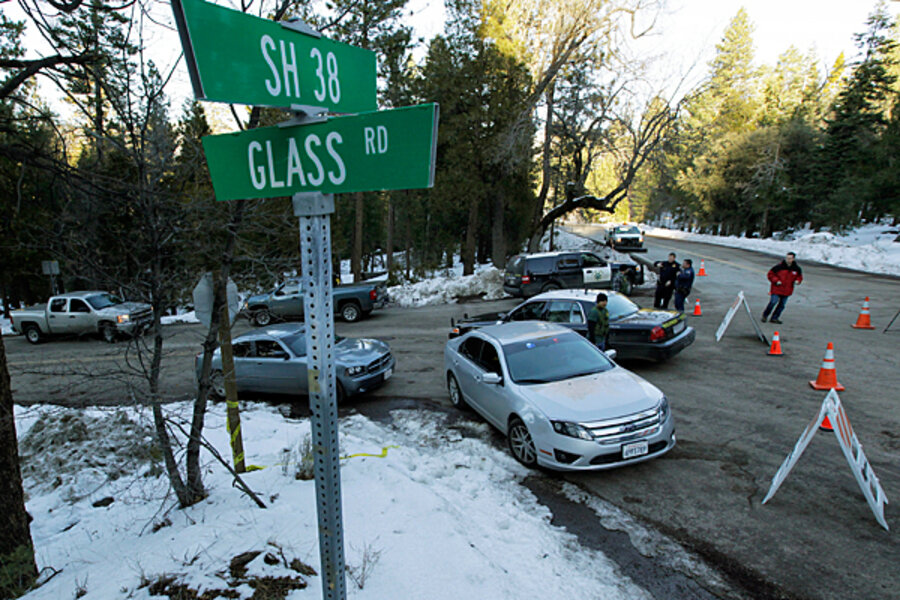Dorner manhunt: What does the public have the right to know?
Loading...
| Los Angeles
Throughout the 10-day manhunt for ex-Los Angeles Police Department officer Christopher Dorner, reporters and the general public bombarded law enforcement with questions about its investigation. How did the final hideout cabin burn? How did Mr. Dorner turn up in a condo 20 yards from the sheriff's mountain command post? Why was a van carrying a grandmother on a newspaper route strafed by police gunfire?
But as the San Bernardino Sheriff’s Department abruptly ended its Wednesday afternoon press conference amid a rising volley of unanswered questions, the question arises: Is it fair to expect all these issues to be addressed?
That depends on who you ask, suggest experts in the ethics of law enforcement. Each side has such different priorities when it comes to unraveling answers after a crime has taken place that conflict is almost guaranteed, says Tod Burke, professor of criminal justice at Radford University in Virginia and a former police officer in Maryland.
“There is a difference between a right to know and a need to know,” says Professor Burke, suggesting that in a 24/7 culture of impatience, "where people stand in front of their microwaves and say 'hurry,' " law enforcement is often in an impossible position. “They want to present themselves as transparent,” he says, just as LAPD Chief Charlie Beck did early in the Dorner investigation. But, then, he points out, they also have a duty to the investigation itself.
“They cannot put out information when they have barely begun their own investigation into what actually happened at a crime scene,” he says. “This is an active, ongoing investigation into many crime scenes by multiple jurisdictions,” he says, adding that meaningful answers may be far off.
But some answers are obvious and should be immediate, says Los Angeles forensic psychiatrist and expert legal witness, Carole Lieberman. “It is not too early to question the police's handling of the rampage,” she wrote in an e-mail.
“There was no excuse for them to barrage a truck with bullets without giving them warning and without it matching the description of Dorner's vehicle. And similarly, we need to ask questions about whether they started the fire [in the cabin] on purpose to take killing Dorner into their own hands before he could kill more police or reveal more information about his wrongful termination,” she says. Dorner maintained in an online manifesto that he had been wrongly terminated from his job as an LAPD officer in 2008.
The public is focused on satisfying its immediate demands for both transparency and accountability, says Donald Tibbs, professor at the Earle Mack School of Law at Drexel University in Philadelphia. But police are focused on the process of investigation itself – which yields partial answers over a period of time that rarely coincides with the demands of press conferences. Beyond that, he says, “they have civil liability to think about. Anything they say could be used in a civil lawsuit that might be brought by the Dorner family, for instance."
The pressure to respond to questions during a criminal investigation has exploded in the Internet age, says former Los Angeles deputy sheriff and FBI agent Frank Scafidi.
“There is a growing population of less-than-professional journalists who, armed with smart phones and a blog, tend to stretch the definition of responsible reporting by catering to the immediacy of the digital age with snippets of information not fully vetted or even accurate,” he wrote in an e-mail. In turn, this cycle feeds the even-larger population of people who see conspiracies behind every government or law-enforcement activity, he says.
“When the demand for information exceeds the official capacity to supply it, then we have the environment for all those others to step in with rumor,” he notes.
Dorner’s manifesto laid down a challenge to law enforcement in this case, points out Mr. Scafidi. “We have a very articulate ‘manifesto’ that predicted the violence and was presented as advance motivation for the carnage that followed and has become a sort of eulogy written by a corpse,” he notes.
As a result, the LAPD is in the unfortunate position of having to defend against charges of a “coverup” in its handling of the events leading to Dorner’s termination, he says, adding, “ that’s why it is extremely important for officials to get as much detailed information as possible out as soon as possible before the conspiracies have time to wind up.”
Scafidi says some questions will simply never be answered to the satisfaction of those demanding answers.
“No amount of official information will offset or defuse a diehard conspiracy theorist,” he adds.







